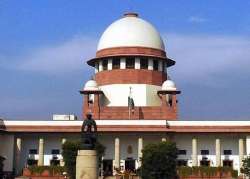Black money: Government submits 627 names in a sealed envelope to SC
New Delhi: The Central government today submitted the list of names of all black money account holders to the Supreme Court. Attorney General Mukul Rohatgi filed set of three documents in a sealed cover which

New Delhi: The Central government today submitted the list of names of all black money account holders to the Supreme Court. Attorney General Mukul Rohatgi filed set of three documents in a sealed cover which contains names of 627 persons.
"Today the matter was heard by the court. The Government of India come up with the details and submitted to the court. There are about 627 names. We have also submitted the status report of accounts being probed by the SIT in the sealed cover," the Attorney General told reporters outside the court.
Earlier on Tuesday, the Apex Court had directed the Centre to furnish the names of all Indians which it had received from the German, French and Swiss authorities.
Rohatgi further said that the court after hearing the matter decided that it will not open the envelop and it will be given to the SIT today itself and they will proceed the probe as required.
"The Supreme Court also said that the assessment of cases, under IT Act, should be completed by 31 March 2015. The Supreme Court has also asked the SIT to file status report on the probe before it by November 30," he said.
"The court has permitted us to place our problems before the SIT for further negotiations. The list was given by the France government in July 2011," he added.
On Monday, the Centre had revealed the name if three business who have stashed away money in foreign banks. The names included -- Pradip Burman, Pankaj Lodhiya and Radha Satish Timblo.
The Apex Court bench headed by Chief Justice HL Dattu had on Tuesday asked the government to disclose the names in a sealed envelope and the court would decide whether it should be investigated upon and by whom.
The Supreme Court's directive on divulging the names came against the backdrop of opposition parties crying foul over the naming of just seven people on Monday even as some ruling party members commented that the full list will embarrass some political leaders.
India has no official estimates of illegal money stashed away in bank accounts overseas. But the unofficial ones range from USD 466 billion to USD 1.4 trillion.
Rohatgi also told the court the Income Tax Act has been amended to extend the limitation period up to March 31, 2015, for recovering taxes from these account holders. Under the earlier provision, a limitation period for recovery of taxes was six years which in these cases came to an end in 2012.
The court directed that the sealed envelopes containing 627 names, including correspondence with the French government, be given to Special Investigation Team (SIT) chairman Justice M.B. Shah and vice chairman Justice Arijit Pasayat. The SIT was set up by the apex court July 4, 2011.
The court said the SIT will move into the matter in accordance with the law.
All the 627 accounts are at HSBC Bank in Geneva - the details of which India got from the French government.
These are also known as stolen data and when the Indian government approached the Swiss authorities for assistance, they refused to help, saying that they don't deal with stolen data.
However, HSBC Bank said that if the Indian authorities get an NOC from the account holders, then it would share the details. As a consequence, about 50-60 account holders gave their consent with NOC.
Rohatgi told the court that the government of India has only one request that care should be taken that nothing should impede in getting information from these countries and others on foreign accounts in future.
Directing further hearing of the matter Dec 3, the court said that the SIT team will submit its status report on the steps taken by it in pursuance to the list of 627 account holders.
On Tuesday, the central government was directed by the Supreme Court to furnish in a sealed envelope the list of all individuals and entities in its possession who have accounts in overseas banks, legitimate or otherwise.
The directive to this effect came a day after the government gave the court the names of seven individuals and one company, alleging they had funds in bank accounts abroad over which proceedings had been initiated for tax evasion.